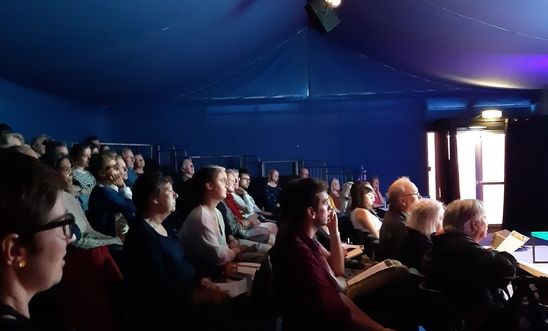
Wednesday 14 August

The Imprisoned Writers Series at the Edinburgh International Book Festival
Since 1997, Amnesty International in Scotland has shared the voices of writers whose human rights have been compromised - because they have been imprisoned, exiled or executed for exercising their freedom of expression; because they face challenges in practicing their rights in their daily lives; or because they live in a country where their rights are oppressed.
These events, known as the Imprisoned Writers Series, seek to challenge, move and inspire by sharing writing by those whose freedom of expression is threatened or denied. Each day we are joined by four of the visiting authors who graciously volunteer their time to read the words of writers who cannot be at the Festival.
The Imprisoned Writers Series exists to amplify voices – both voices that cannot be heard because their right to speak has been taken away, and also those voices that we may find uncomfortable to hear. Not all of our authors have experienced detention, but they have all had their rights challenged, and have all fought to claim their rights.
By Any Means Necessary
International human rights documents including the United Nations Standard Minimum Rules for the Treatment of Prisoners protect the human rights of prisoners, including the right to communicate with the outside world. However, these are not universally accepted or implemented and people who are unjustly imprisoned are often denied this, and other, rights.
This makes achieving contact with the world outside prison a difficult and risky enterprise, all the more so when your communication details the conditions inside the prison walls.
Today we will hear from four prisoners who took that risk, and the sometimes unusual methods they adopted in order to do so.
The readings
Cuban journalist Victor Rolando Arroyo Carmon centred his reporting on the failings of the regime, principally on the topic of public health. In March 2003 he was returning from Havana, he was detained just metres from his house. After 17 days he was sentenced to 26 years in prison and confined to the easternmost point of the country, 600 miles from home, in the highest security provincial prison. He was finally released, along with 52 other dissidents, in November 2010. Today’s reading is an interview delivered by phone in 2005.
Kurdish-Iranian Behrouz Boochani fled Iran to escape persecution for his dissident journalism in 2013, arriving in Manus just days after the policy to detain all asylum-seekers reaching Australia by boat was introduced. 2019 marks his sixth year of indefinite detention on Manus Island. No Friend but the Mountains: Writings from Manus Island Prison written via WhatsApp on a smuggled phone this year won the $70,000 Victorian Prize for Literature in Australia.
Poet Irina Ratushinskaya received a sentence of seven years in a labour camp, charged with “agitation carried on for the purpose of subverting or weakening the Soviet regime”. She was held in the Small Zone, a special unit for women political prisoners. Even in prison, Irina was able to continue writing. Deprived of paper, she would scratch her poems on bars of soap, commit them to memory, erase them and reconstitute them when eventually paper came to hand.
Ngũgĩ Wa Thiong’o is one of Kenya’s best-known writers. Sharply critical of the inequalities and injustices of Kenyan society, publicly identified with unequivocally championing the cause of ordinary Kenyans and committed to communicating with them in the languages of their daily lives, Ngũgĩ was arrested and imprisoned without charge at Kamiti Maximum Security Prison on December 31, 1977. Devil on the Cross is the novel written while he was incarcerated. In today’s reading he describes writing in prison.
Take Action
If you have been provoked to take action by today’s event, Amnesty International are currently campaigning to free women activists in Saudi Arabia who have been detained for fighting for the right to drive and risk up to 20 years in prison.
Our blogs are written by Amnesty International staff, volunteers and other interested individuals, to encourage debate around human rights issues. They do not necessarily represent the views of Amnesty International.
0 comments